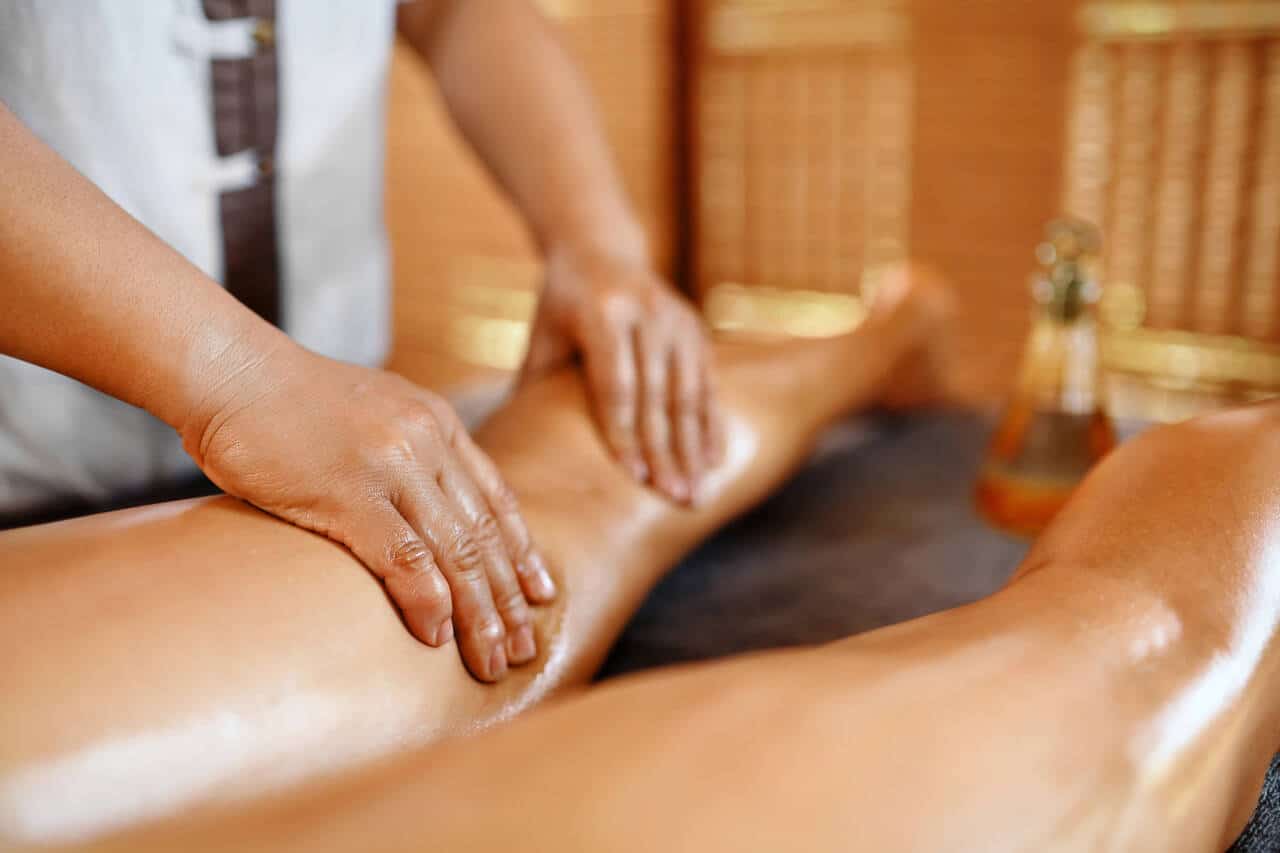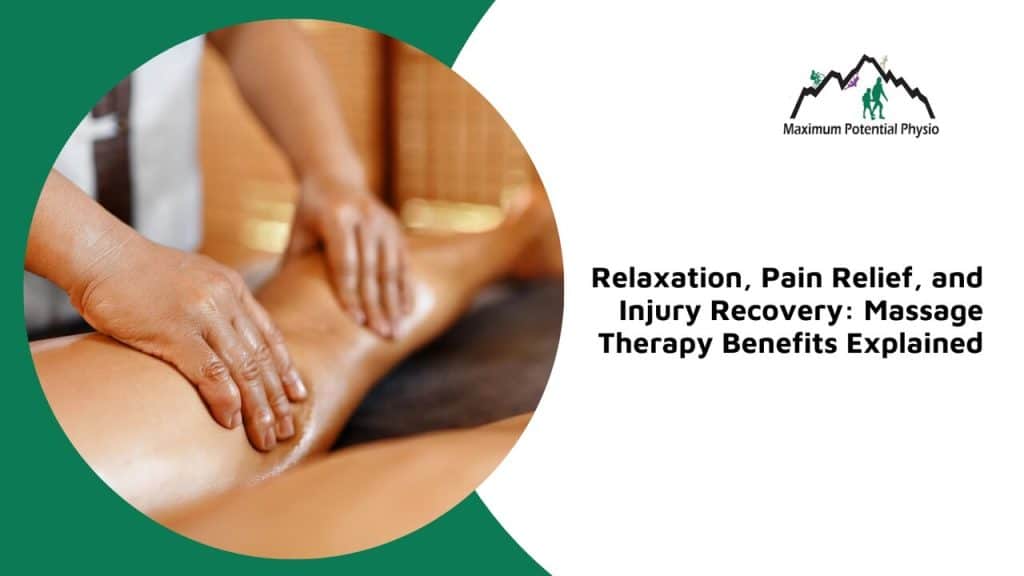Relaxation, Pain Relief, and Injury Recovery: Massage Therapy Benefits Explained

Massage therapy is more than just a way to relax—it's a therapeutic practice that offers numerous health benefits. From easing muscle tension and improving circulation to aiding injury recovery, regular massage sessions can be a vital part of a comprehensive health and fitness routine. Whether you're recovering from an injury or looking to relieve chronic pain, massage therapy can provide both immediate relief and long-term health benefits.
Understanding the Benefits of Massage Therapy
Massage therapy offers a wide range of health benefits. Here's how it can improve your well-being:
- Pain Relief: Massage therapy targets areas of muscle tension, helping to alleviate both acute and chronic pain. Techniques such as deep tissue massage and trigger point therapy work to release tight muscles and improve circulation, offering relief from discomfort.
- Improved Circulation: By stimulating blood flow, massage helps deliver oxygen and essential nutrients to the muscles and tissues. This enhanced circulation speeds up recovery and promotes overall health.
- Stress Reduction: One of the most immediate benefits of massage is stress relief. By reducing cortisol levels and relaxing tight muscles, massage helps to calm the mind and body, making it an excellent treatment for those suffering from anxiety or stress.
- Increased Flexibility: Regular massage helps to stretch tight muscles, improving flexibility and mobility. This is especially beneficial for athletes or individuals recovering from injuries.
- Enhanced Immune Function: By promoting relaxation and reducing stress hormones, massage therapy can strengthen your immune system, making it easier for your body to fend off illness.
Health Conditions That Benefit the Most from Massage Therapy
Massage therapy can be especially beneficial for individuals dealing with certain health conditions. Here are some of the conditions that may benefit the most from regular massage therapy sessions:
- Chronic Pain: Conditions such as fibromyalgia, arthritis, and lower back pain can be effectively managed with massage therapy. Regular sessions help reduce muscle tension, improve blood flow, and decrease inflammation, all of which contribute to pain relief.
- Sports Injuries: Whether it's a sprained ankle, strained muscle, or tendinitis, massage therapy can aid in recovery from sports injuries by promoting faster healing, reducing muscle soreness, and improving range of motion.
- Headaches and Migraines: Massage therapy can alleviate tension headaches and reduce the frequency and severity of migraines by relaxing tight muscles in the neck, shoulders, and scalp, which often contribute to headaches.
- Post-Surgical Recovery: After surgery, massage therapy can help reduce scar tissue formation, improve circulation, and relieve post-operative pain, speeding up the recovery process.
How Does Massage Therapy Aid in Injury Recovery?
Massage therapy plays a crucial role in the rehabilitation process after an injury. Here’s how it aids recovery:
- Reducing Swelling and Inflammation: Injuries often cause swelling and inflammation, which can delay healing. Massage helps reduce these symptoms by improving lymphatic drainage, allowing your body to clear out excess fluids and promote healing.
- Breaking Down Scar Tissue: Massage techniques can help prevent and reduce scar tissue buildup, which can restrict movement and cause stiffness. By breaking down scar tissue, massage therapy helps restore mobility in the injured area.
- Promoting Muscle Repair: Massage stimulates blood flow to injured tissues, delivering oxygen and nutrients needed for muscle repair. This acceleration in the healing process allows for quicker recovery from strains, sprains, and other soft tissue injuries.
- Relieving Pain: Massage helps relieve pain from injuries by targeting muscle tightness, tension, and spasms. This pain relief makes it easier to participate in physiotherapy exercises and activities designed to restore full function.
How Does Massage Therapy Complement Other Treatments Like Physiotherapy?
Massage therapy and physiotherapy work hand-in-hand to accelerate recovery and improve overall health. While physiotherapy focuses on restoring movement and strengthening muscles through exercises and mobility work, massage therapy addresses soft tissue issues, such as muscle tightness and imbalances, that may hinder progress. Here’s how they complement each other:
- Enhanced Flexibility: Massage loosens tight muscles, which allows for greater flexibility and range of motion in physiotherapy exercises.
- Pain Reduction: By alleviating muscle tension and pain, massage therapy allows individuals to engage in physiotherapy exercises more comfortably and effectively.
- Improved Circulation: Enhanced blood flow from massage therapy speeds up the healing process, supporting physiotherapy’s focus on recovery and rehabilitation.
- Injury Prevention: Regular massage helps identify and treat areas of tension that could lead to future injuries, aligning with physiotherapy’s goal of preventing re-injury.
Together, massage and physiotherapy provide a comprehensive approach to healing, helping individuals recover more fully and maintain long-term health.
How Often Should I Attend Massage Therapy Sessions for Optimal Benefits?
The frequency of massage therapy sessions depends on your individual health needs and goals. For general maintenance, stress relief, and relaxation, scheduling a massage once or twice a month is typically sufficient. However, if you're recovering from an injury or managing a chronic condition, more frequent sessions—such as once a week or biweekly—may be recommended.
Athletes or those with physically demanding jobs may benefit from regular massage sessions to prevent injury, reduce muscle soreness, and maintain peak performance. Your massage therapist can help create a customized treatment plan to maximize the benefits of massage therapy based on your specific needs.
Massage Therapy Sessions: What to Expect
When attending a massage therapy session, it’s important to know what to expect so you can feel relaxed and comfortable throughout the process. Each session typically starts with a consultation, where your massage therapist will ask about your medical history, any areas of pain or discomfort, and your goals for the treatment. This helps the therapist tailor the session to meet your specific needs.
Once the consultation is complete, the therapist will leave the room to allow you to undress to your comfort level. You will then lie on the massage table, usually under a sheet or towel, and the therapist will begin the treatment. The techniques used will depend on your goals and may include Swedish massage for relaxation, deep tissue work for chronic pain, or sports massage for injury recovery. The pressure can be adjusted to your comfort level, so feel free to communicate with your therapist during the session.
After the session, your therapist may provide recommendations for stretches or self-care practices to extend the benefits of the massage. You may feel immediate relief from muscle tension, but some individuals experience mild soreness the day after the session, which is completely normal as the body adjusts to the treatment.
Is There Anyone Who Should Avoid Massage Therapy?
While massage therapy is beneficial for many, there are certain conditions where it might not be advisable, or where special precautions should be taken. It’s important to consult with a healthcare professional or massage therapist before starting treatment if you have any of the following conditions:
- Open Wounds or Skin Infections: Massage can irritate the skin or spread infections, so it’s important to avoid therapy if you have open wounds or contagious skin conditions.
- Blood Clots or Deep Vein Thrombosis (DVT): Individuals with a history of blood clots should avoid massage therapy, as there’s a risk that massage could dislodge the clot and cause serious complications.
- Fever or Infectious Illness: If you’re feeling unwell, particularly with a fever, it’s best to reschedule your massage session to avoid spreading illness and to allow your body the rest it needs to recover.
- Certain Heart Conditions: Individuals with specific heart conditions should consult their doctor before undergoing massage therapy, as some techniques can affect circulation and blood pressure.
- Recent Surgeries: If you’ve recently undergone surgery, it’s important to wait until your doctor has given you clearance for massage therapy. Massage around the surgical site too soon can delay healing or cause complications.
Always disclose your health history to your massage therapist so they can ensure the session is safe and effective for your needs.
Relax and Recover
Massage therapy offers numerous benefits that go beyond relaxation. Whether you're dealing with chronic pain, recovering from an injury, or looking to improve your overall well-being, incorporating massage into your routine can have a profound impact on your health.
At Maximum Potential Physiotherapy in Calgary NW, our team is dedicated to helping you achieve your health goals through personalized massage therapy treatments. Contact us today to book your session and experience the benefits for yourself.

